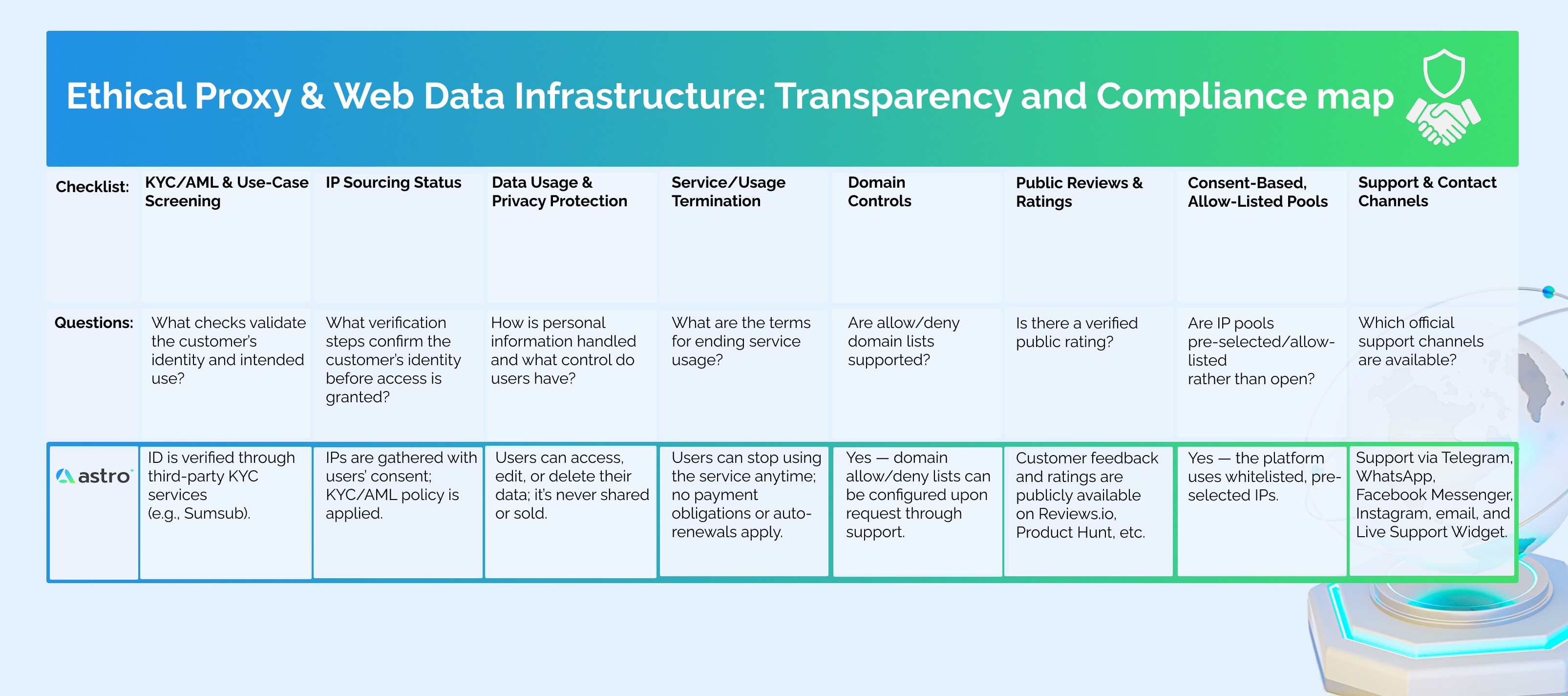Proxy infrastructure transparency checklist
04 November 2025
Last updated: December 2025
Public web data powers price tracking, competitive research, brand safety reviews, and AI evaluation — work that depends on reaching the same pages a regular person would see. What separates dependable access from churn is the provenance of addresses and the way sessions behave over time.
As an ethical proxy infrastructure, Astro focuses on both: consent-based pools with city- and ISP-precision for real people flows, which is what teams actually want when they buy residential and mobile proxies or look to buy residential IPs in a specific city, measured rotation aligned to task boundaries for volume work that usually gets pushed onto the best datacenter proxies, and project level domain controls. The sections below turn these ideas into criteria your procurement, security, and engineering teams can share. No guesswork, just artifacts to request and standards to uphold.
How to evaluate proxy infrastructure in 2025–2026: foundations (consent provenance and session consistency)

Downloadable checklist and transparency map: what to verify and the evidence to request
KYC / AML and use-case screening
Any serious provider should review who is asking for access and for what purpose before anything goes live. That means third party KYC, an intended use check, and a real escalation path handled by a human instead of automatic approval. Effective setups start with two foundations that reinforce each other: verifiable consent for address sourcing and consistency in how sessions behave over time. Astro treats provenance as part of quality control in AI pipelines, where automation increases throughput and therefore raises the bar for proof of participation, opt-in renewal, and simple removal requests.
Consent-based, allow-listed pools
Session consistency is the operational side of trust. Pin a location that matches your audience, prefer a specific ISP or carrier when available, keep a sensible sticky window, and rotate at task boundaries rather than every request; these practices mirror city and ISP level targeting with sticky sessions built for account continuity, where realistic continuity matters most.
Data usage and privacy protection
Before you start, confirm essentials with Astro or any provider you vet: third-party KYC with intended-use review and a human escalation path, encryption in transit for HTTP(S) and SOCKS5 with standard auth, project-level domain allow or deny lists managed via support, a plain-language privacy page, and an exportable onboarding log; this aligns with the idea of equal access to information and keeps your approach accountable.
Prefer a quick walkthrough? Watch this short video on connecting to Astro and routing your requests step by step:
Provider evidence and operational control
Astro treats proxy access as an ethical infrastructure, which means the provider should be able to show how access is sourced, how it is governed over time, and how a session behaves in practice, not just talk about coverage.
IP sourcing status
The first thing worth asking for is a short sourcing brief. It should make clear where the addresses come from, how people or companies agreed to take part, how that agreement is refreshed, and how they can leave the pool. You want clarity whether you plan to buy residential and mobile proxies for social level activity, want to buy residential IP for a single region test, or are evaluating the best datacenter proxies for high volume public collection. Before you proceed with open web data extraction, check out this information about the cyber security safeguards improving legal and ethical enterprise web scraping standards.
Domain controls
You want a project level domain policy so you can allow or deny specific destinations, encryption in transit for HTTP(S) and SOCKS5 with normal authentication, and a short configuration note that spells out how long a sticky session is supposed to live and when rotation is appropriate. Account flows like login, checkout, and multi-step forms should sit on one steady session with a sensible sticky window, because at that point the site expects a continuous session state, and breaking that state too aggressively just creates friction. Bulk collection, on the other hand, is scheduled to rotate at task boundaries instead of switching identity on every single request.
Flows that need continuity, like login, account actions, checkout or form completion, should sit on one steady sticky session with a sensible window, because at that point the site expects a consistent identity instead of a new visitor on every single request. High volume collections are different. There you rotate at task boundaries to spread load without tearing that continuity in the middle of a flow.
Service / usage termination
Access should be easy to stop at any moment, with no ongoing payment obligation and no silent auto-renewals. A transparent provider offers a full proxy trial with pay-as-you-go pricing instead of locking buyers into a subscription, and publishes uptime and coverage next to competitors. Leaving the service should not require lock-in or extra steps.
Public reviews and ratings
A provider that calls itself reliable should also be comfortable sharing public proof in the form of real numbers like uptime, geographic breadth, response time from support, and session success rate under load. For us at Astro, reviews matter more than adjectives.
Support and contact channels
Support should be reachable on real channels like Telegram, WhatsApp, live chat, and email, with a clear escalation path instead of a ticket black box. Note that Astro complies with each of the points, and when you contact our Support Team for a proxy free trial, there are people, not bots, to address your requests and messages.
Transparent infrastructure is not about perfection; it is about proof. When sourcing, onboarding, and session control are documented, teams can move fast without crossing lines they do not see. Astro builds around that idea, so every part of access, from consent to rotation, can be explained, measured, and trusted.
Related questions
-
Check the sourcing dossier and coverage list; Astro’s approach is based on opt-in participation and verified regional pools.
-
Rotate between tasks, not every request, and keep a reasonable sticky window — the same logic used in Astro’s configuration defaults.
-
Watch session lifespan by city or ISP; longer, steady sessions, a pattern typical for Astro’s allow-listed pools, indicate reliable performance.



